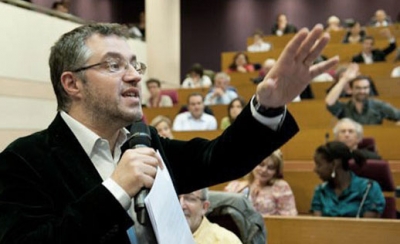2015/2016 season

Follow Tuesday space talks on @CNES with the hashtag #CNEStweetup.
Podcasts
13 October 2015 - Oceans and climate
New space missions, satellites and technologies are boosting efforts to study how climate change is affecting the world’s oceans. Oceans currently store more than 90% of the excess heat generated through greenhouse gas emissions and are warming as a result. Melting ice and global warming are causing rising sea levels tracked on a routine basis by altimetry satellites. Observing oceans is therefore key to understanding and anticipating the impacts of climate change on flora and fauna, as well as on coastal populations. How is a changing climate affecting phytoplankton, fisheries, ecosystems, biodiversity and temperatures? It is these questions and many more that the Jason-3 satellite is designed to answer. In a little more than 20 years, the Jason series of altimetry satellites has made CNES one of the world’s leading proponents of space oceanography.
Speakers: Anny Cazenave, CNES; Marina Levy, Institut Pierre Simon Laplace.
15 December 2015 - Alien: A monster of a film
Released in 1979, Ridley Scott’s Alien has become a landmark science-fiction movie. Initially conceived simply as a horror film in space, Alien brought together talents to address a range of novel themes including advanced space transportation, in-situ space resource utilization, physiology and space medicine, and exobiology. Nearly four decades after the film first hit the silver screen, these themes have become everyday talking points—a tribute to its creators and an invitation to a Tuesday space talk on the line between science fiction and reality.
Speakers: Pascal Bultel, CNES; Francis Gaspari, AAAF.
19 January 2016 - Pluto: Mountains of surprises
Pluto is the last planet—today reclassified as a dwarf planet—to have been visited by a space probe when New Horizons sped past the Pluto-Charon system and its four smaller moons Styx, Nix, Hydra and Kerberos. The Pluto system truly is a miniature solar system that could teach us a great deal about the formation and composition of these icy bodies in the Kuiper Belt that have remained largely uncharted territories until now. Tonight’s talk will look at the latest discoveries about these most mysterious objects.
Speakers: Francis Rocard, CNES; François Forget, LMD.
16 February 2016 - LISA Pathfinder in search of invisible worlds
Black holes are regions of the Universe where gravity is so strong that neither matter nor light can escape them. When black holes interact, they emit gravitational waves that warp space-time as predicted by Albert Einstein. These waves, recently observed directly for the first time, are set to open a new window on the part of the Universe that is invisible to electromagnetic wavelengths. Such is the challenge facing the future LISA space mission and its precursor LISA Pathfinder, launched late 2015.
Speakers: Sylvie Léon, CNES; Pierre Binetruy, APC.
15 March 2016 - Pleiades: Seeing France in a new light
Since 2012, the globe and France in particular is under close watch by the Pleiades system, a constellation of two sophisticated very-high-resolution (70 cm) satellites offering new levels of agility and precision. Pleiades combines tracking of land occupancy all over France—supporting urban mapping, forest cover monitoring and environmental protection—with a detailed picture of landscapes. These capabilities are paving the way for applications previously out of reach to satellites, such as estimating urban density (per unit area and unit volume), determining tree heights to gauge forest biomass or calculating ice mass variations on Mont Blanc.
12 April 2016 - Latest news from Mars
While Mars is sometimes the subject of wild speculation, it is nonetheless a place where dreams are fast becoming reality. Missions such as Mars Science Laboratory (MSL) and its Curiosity rover are already roaming the red planet, and more are set to follow with ExoMars, and then InSight in 2018, which will probe its interior. So, where is Curiosity now? And what of more-far-out projects like Mars 500, Mars One and NASA’s Journey to Mars? Tonight’s talk will review the latest results from current missions and look at the science behind others.
Speakers: Francis Rocard, CNES; Patrice Coll, LISA.
17 May 2016 - Launchers: To infinity and beyond
The incredible lunar adventure of the 1960s fuelled the dreams of a generation of engineers, authors and filmmakers. Fifty years later, launch vehicles still rely on heritage technologies very similar to their predecessors and the venerable Soyuz continues to operate from Baikonur, Kourou and soon Vostochny. But space access now finds itself at a crossroads facing several expected and unexpected technological and economic shifts, with the advent of reusable launchers, small satellites, private spaceflight, in-orbit services, industry 4.0 and 3D printing, and the disruptive influence of digital giants such as Elon Musk (PayPal/SpaceX), Jeff Bezos (Amazon/Blue Origin) and Paul Allen (Microsoft/Stratolaunch) challenging the sector’s traditional players. Where do we now stand between dreams and reality? And where will our dreams take us next?
Speakers: Jérôme Vila, CNES; Alain Souchier, Planète Mars.
24 May 2016 - Exploring and protecting planets (initially scheduled 17 November 2015)
While exploring planets and their satellites is a most worthy endeavour, preserving them from ‘forward’ contamination by terrestrial micro-organisms is an obligation. Scientists dream of bringing back samples from Mars, Titan, Europa and Enceladus. But it is also their absolute duty to ensure they don’t ‘backward’ contaminate Earth’s biosphere with unknown extraterrestrial micro-organisms. Protecting our planet and those we explore are the two challenges that science must meet to explore our solar system in all conscience.
Speakers: Michel Viso, CNES, and 2 young researchers funded by CNES.
14 June 2016 - Of myths and heavens
Faced with the secrets of our condition, we humans are forever inventing and moving forward. Illustrating this deep-felt need, myths embrace and test the solutions we imagine, and the heavens have inspired a rich vein of mythological creations: the presumptuous Icarus, the fearsome Apophis, the beautiful Ariane…
Speakers: Jacques Arnould, CNES; Sylvie Dallet, university Arts lecturer (UPEM).
Practical information

How to get there and how it works
Tuesday space talks from 7:30 to 9:30 p.m. - Upstairs at the Café du Pont Neuf, 14 quai du Louvre, 75001 Paris (metro/RER Châtelet-Les Halles and metro 7 Pont-Neuf).
Entry free.
If you feel like a drink while slaking your thirst for knowledge:
€6* for first drink if coffee, tea, soft drink, 25 cl glass of beer or glass of wine
€10* for first drink if whisky, gin, port or similar, or 50 cl glass of beer.
* Surcharge on first drink if ordered with a meal.

Your hosts
- Tuesday space talks are organized by CNES and the Bar des Sciences association
- Moderated by science journalist Paul de Brem
- With musical interludes from pianist Xavier Ferran









